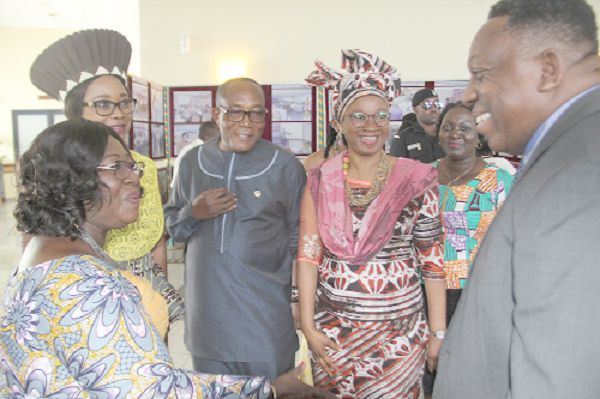
Goverment’s poverty reduction initiatives:Demonstration of commitment to SDGs — Osei Opare
The Chief of Staff, Mrs Frema Osei Opare, says the government has demonstrated commitment to the attainment of Agenda 2030 of the Sustainable Development Goals (SDGs) with the adoption of a broad and holistic approach towards poverty reduction through its special initiatives.
According to her, “in this modern era, enhancing social inclusion in all facets of the society remains cardinal in our bid to ensure sustainable development” and that social development, particularly the drive towards achieving a gender-just society with adequate protection for all vulnerable persons, remained a shared goal and a national priority.
Agenda 2030 emphasises gender and racial equality, eradication of poverty and the total abolition of violence and hate to be achieved through sustainable development and control of climate change.
The Chief of Staff said this at the maiden Ministry of Gender, Children and Social Protection (MoGCSP) summit in Accra last Monday.
The summit, themed “Promoting Social Inclusion: Leave No One behind,” is aimed at taking stock of activities, programmes, achievements and challenges of the ministry for the year 2018 to help realign the ministry for improved performance.
Advertisement
Community engagements
“As social partners, we need to build the requisite bridges by deepening community engagements and enhancing neighbourliness in order to guarantee decent life for all,” she said.
She said promoting social inclusion required the efforts of all by instituting the requisite institutional and policy framework towards monitoring and tracking progress and deficiencies in order to ensure that no one was left behind.
She stated that the formulation of the Coordinated Programme of Social and Economic Development Policies (2017-2024) had integrated the implementation of development programmes such as Planting for Food and Jobs, the Nation Builders Corps (NABCO), Free Senior High School, One District, One Factory, One Village One Dam and many others aimed at building both economic and social resilience against vulnerabilities.
Ministry’s interventions
The Minister for Gender, Children and Social Protection, Mrs Cynthia Morrison, said the ministry had over the years developed policies, strategic plans and legislations to support the implementation of social intervention programmes in the country.
She mentioned some key interventions to include National Gender Policy, the Ghana School Feeding Policy, the Children’s Act, the Disability Act, a five-year strategic plan to address teenage pregnancy and a national framework on ending child marriage.
She added that the ministry was also implementing several social intervention programmes such as the Livelihood Empowerment against Poverty, the Ghana School Feeding Programme, an amendment of the Disability Act to bring it in line with the UN Convention on Disability, as well as the introduction of a toll free helpline for social protection services.
Partners’ support
The United Nations Children’s Fund’s (UNICEF’s) representative to Ghana, Ms Ann-Claire Dufay, in a solidarity message, on behalf of the UN Systems in Ghana, said the summit demonstrated the ministry’s commitment to accelerate progress for children and women and to reduce inequalities through social protection interventions for the extreme poor and most vulnerable in the country.
Giving an overview of the ministry’s mandate, the Chief Director, Dr Mrs Afisah Zakariah, said the ministry was mandated to coordinate and ensure gender equality and equity, promote the survival, social protection and development of children, vulnerable and excluded and persons with disability, and integrate fulfilment of their rights, empowerment and full participation into national development.
The Chairman of the Parliamentary Select Committee on Gender, Dr Kojo Appiah-Kubi, pledged the committee’s commitment to help in passing gender sensitive laws to help alleviate the plights of the vulnerable in the society.
